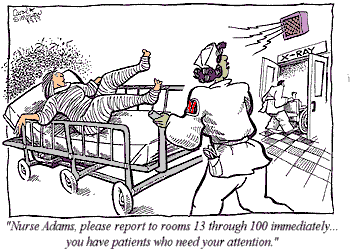
Jax Nurses In Crisis
c.2005
by
John Cowart
This article appeared in Jacksonville Magazine, Spetember, 1987. The situation has not changed greatly.

Back in the Gay Nineties, the 1890s, Jacksonville needed nurses – but had trouble finding them.
Is it any wonder?
In those days nurses were expected to be skilled in “reading, penmanship, simple arithmetic, and English diction”.
On the job they were expected to supply their own “uniforms, books, stationary, thermometer, and hypodermic syringes”.
Jacksonville’s first hospital, St. Luke’s sought, “Women desirous of learning the art of caring for the sick… Women of superior education and refinement… Competent and refined ladies who are willing to serve in the capacity of nurses for our citizens at the nominal price of ten dollars per week…”
Fringe benefits offered to such ladies of refinement included being able to wash her own uniforms and clothing in the hospital laundry room.
St. Luke’s 1891 Annual Report lamented, “There must be those in the state, if not in the city, who desiring to live for a high and noble purpose, will ere long enter this open door through which they may pursue their high calling”.
Some things have changed on the Jacksonville nursing scene; others haven’t.
Jacksonville hospitals still seek women of superior education and refinement who live for a high and noble purpose pursuing their high calling with a willingness to serve.
That has not changed.
Nor is it likely to.
Thank God Jacksonville hospitals are filled with nurses of such caliber already. The dedication, compassion and spirit of service which Jacksonville nurses offer to the sick has not changed either.
Jacksonville still needs nurses.
Problem is, so does everyplace else.
Projections by the U.S. Department of Health and Human Services show that the nation will be short 400,000 registered nurses by 1990 and that every graduating nurse will have at least two job opening waiting for her.
Yet, while Jacksonville – and the nation – faces a crisis in the form of a shortage of nurses, each individual nurse faces crisis situations most of us never even dream about.
Some nurses have been spit on – not by a sick patient but by disgruntled family members.
Some have seen physicians loose their usual cool, blow up and throw temper tantrums.
Nurses work under constant scrutiny of physicians, patients, supervisors, family members and other nurses.
When breathing stops or bleeding starts the nurse must act immediately and correctly; yet, she may face a law suit for what she does.
Nurses are constantly being offered lucrative positions in other fields, so they are being confronted with career decisions daily.
They work long hours among people who are hurt, afraid, demanding and in need of attention – sometimes more than a nurse can give.
Nurses cry.
Sometimes alone.
They see death firsthand.
 “You never get used to seeing a patient die. Never,” said one veteran nurse.
“You never get used to seeing a patient die. Never,” said one veteran nurse.
To handle the crisis confronting them daily some nurses pray and read the Bible; others get drunk and do drugs. Some renew their strength and go on; others burn out and quit.
A number of local nurses agreed to talk about the crisis in their lives and in nursing in general. Many more responded to the author’s questions than can be included. My sincere thanks to each one who talked with me on her own time and to each one too busy taking care of patients to respond to my questions. Here is a summary of the information they shared:
Dr. Hutchinson, a nurse anthropologist, is an associate professor at the Jacksonville Health Education Program of the University of Florida.
She has written a monogram, Nurse Self-care and Job Stress, scheduled to be published in IMAGE, Yale’s Nursing Honors Journal.
“I interview a lot of hospital nurses and find that different areas of the hospital bring different kinds of stress, each one unique,” she said.
“All kinds of pressures come at you and you have to bend or break rules. A nurse faces the pressure of several decisions all at once. Immediately, she has to decide what has to be done first and what gets put off.
“Often, no matter what decision she makes, she’s wrong.
“People are dying and suffering around you and understaffing is severe. You can’t do what you were trained to do, so some nurses become street smart. That is, they do things in the most effective and efficient manner for themselves. They work more quickly, but this is not the best socio/psychological care for the patient. The nitty-gritty parts of the job get done, but the patient gets short-changed.
“Other nurses exit the situation – that is, they quit nursing or find less stressful jobs where crises are fewer – to minimize stress.
“Others disengage themselves from patients as people. Rote care is given in order for the nurse to survive. This is a preliminary to total burn out.
“What do you have to do when you don’t have time or energy to give and give and give?
“Some turn to drug or alcohol abuse, and this is always related to job stress.
“The mental attitude here is that I give drugs to the patients to help them get better; therefore, when I’m so stressed and in pain, it will help me get better.
“It is a self-care effort, but it’s misdirected and self-destructive.
“The incidence of drug and alcohol abuse is no higher in the nurse population than in the general population, but nurses have more access.
“The state board does have programs for impaired physicians and nurses.
“Many hospitals have psychiatric liaisons who come to units where nurses need help coping with dying babies, or burn victims, or with loosing a number of patients in a short time.
“In many hospitals, nurses have initiated nurse practice committees where nurses and physicians communicate regarding the practice of medicine,” she said.
Dr. Hutchinson’s IMAGE monogram makes five suggestions to nurses in crisis:
“What do you have to do when you don’t have time or energy to give and give and give?”

Elise Hannemann volunteered as a candy striper when she was in grade school and as a nurses’ aid in a nursing home during her summers in high school. She graduated from a 3-year RN program in Lewiston, Maine. She works in a critical care step-down unit at Memorial Medical Center of Jacksonville.
“We take care of patients not quite ready to go to regular floors. They need to be monitored and ventilated. They are not sick enough for critical care but are too sick for regular floor.
“I’ve been having a very difficult time. Our unit is in high demand because most patients need heart monitoring. We’ve been extremely busy and understaffed. Especially since they instituted DRG (Diagnostic Related Groups, a government requirement regulating how long a patient should be in a hospital for a specific illness), we see a big difference in the treatment and length of stay.
“There is a nursing shortage; we work double shifts, 12-hour shifts, anything we can do to fill in,” she said.
Mrs. Hanneman had just worked the 12 hours before her interview.
“What helps stress? I don’t know. I’m thinking of going part-time because of my heavy schedule.
“My husband’s at sea for six months therefore I don’t have anybody to blow off steam to. There are a lot of other Navy wives in nursing in Jacksonville who’ll know what I mean.
“I’m hoping part-time will take some of the burden off me and relieve the stress level and let me get a few normal things done around the house.
“We see a lot of repeat customers over and over again. But heart patients do get better and go home independent for a while. But sooner or later we see them again about 50 per cent of the time.
“Our patient ratio is about three patients to one nurse during the day shift, and on other floors it’s about five to seven to one nurse. I think Five to one is about the ideal.
“We work a lot of double shifts, and this is not optional; it’s a scheduled thing.
“The more critical the patient is, the less the patient load.
“Nurses put forth extra effort to keep up the level of patient care.
 “When I got out of school into a critical care unit I learned a lot quickly. It’s frustrating not to be able to always take care of patients the way I was taught in nursing school. There’s a lot more responsibility, more patient load. What we have to do is less than I want to do.
“When I got out of school into a critical care unit I learned a lot quickly. It’s frustrating not to be able to always take care of patients the way I was taught in nursing school. There’s a lot more responsibility, more patient load. What we have to do is less than I want to do.
“”Burn out is very high among critical care nurses because you can only take it a short time. It’s rare to stay there more than three or four years because of the stress. That’s universal.
“The turnover rate is quite high and it seems to come in batches; six people leave all at once and six new ones come in at the same time. Like in waves,” she said.
Mrs. Hannemann attends a weekly bible study at a friend’s home to help her cope with stress.
“I’m a new Christian – I found the Lord since coming to Jacksonville – but at home before going to work, I’m able to ask the Lord to help me get through that day. To remind me that whatever I face it’s just for that particular moment, and that He is there with me.
“I’ve seen a difference since I started doing that.
“And every day I pray that I won’t get callous,” she said.
Judith Halpin, assistant head nurse of a surgical unit at Memorial, has been a nurse for eight years.
A model ship graces her unit’s office.
Shortly before he died a terminal patient constructed it on his bed-side table to show his appreciation for the care the unit’s nurses were giving him. It took five months for him to build the ship – five months to die.
Ms Halpin supervises 22 people including three LPNs, one assistant and three unit secretaries.
“We handle back, brain, gall bladder – run of the mill surgery, and the overflow from GYN, orthopedics and urology,” she said.

“Staffing is a big problem. Right now I’m trying to schedule enough nurses and I’m two days behind.
“I need a quota of five nurses each day shift, four evening nurses and two night.
“This is beginning to get stressful.
“I’m working overtime right now, and my assignments for next month were due two days ago and I still haven’t figured it out.
“There are a lot of changes in the staff. People come and go. Not many work for 30 years like they used to.
“In a clinical area, new nurses – say those from other hospitals – come with their own ideas; they have to learn that they work here now. But I’ve found nurses very cooperative, very willing. Adjusted work schedules disrupt their lives, and I feel fortunate they make the changes without hassling me at all.
“I see my nurses working to capacity to give the best patient care. But they get tired and burn out. When the patient census gets low, I tell them to rest and take it as easy as they can while they can.
“Nurses in this unit have been working every other weekend since February, but things are easing up and we’re working one in four now.
“I think these nurses are wonderful.
“They are willing to jump in and help. They’re fabulous. Terrifically cohesive. They keep my wits together. There’s little competition and no cattiness.
“The hardest thing? Death is hard regardless of the age of the patient. It’s always difficult to let a patient go.
“But the best thing is seeing a critical care patient work through the healing process and be able to usher him out the door healthy.”
BETTY CROWELL
Betty Crowell, an advanced clinical practitioner in psychiatric nursing at St. Vincent’s Medical Center, was a finalist for the 1985 Florida Times-Union EVE Award. She has been a nurse for 30 years. She won the 1984 St. Vincent’s Founder’s Award. She is active in the Nurses Christian Fellowship www.intervarsity.org/ncf/ .
“I had done volunteer work for the Sisters of the Poor in a house for elderly people on 96th Street in New York and went into nursing training straight from high school. That was about 1954,” she said.
“I feel this is my ministry as a Christian servant.
“The philosophy I was trained under was to help people by being there. You share Christ’s presence if you even offer a drink of cold water in His name.
It’s all in your perception of what motivates you and I feel this is what the Lord wants me doing.
“It’s like where you are coming from. Is this a job? A career? A ministry? Any job can be one of those things according to your own perceptions. And service is one thing a Christian is to provide.
“Meeting spiritual needs is part of nursing practice.
“Spiritual, emotional, and physical are all practical needs of the patients we care for. Everyone has a value and belief system; it is their spiritual realm. We don’t force religious practices, but we try to foster spiritual awareness and care for all the needs.
“You may not pray openly or verbally, but your presence is meaningful.
“We (NCF members) attempt to face ethical dilemmas in a consistent spirit. We encourage growth for self as well as meeting the professional and personal challenges of nursing with Christian integrity,” she said.
In fostering her own growth, Ms Crowell returned to school and in 1985 graduated Summa Cum Laude from UNF with a 4.0 average. “I’m an old nurse and I’m a new nurse,” she said.
Her daughter, Elizabeth C. Fagin, is also a nurse.
Elizabeth C. Fagin, a critical care nurse at St. Vincent’s, has been in nursing for seven years.
“Going into nursing was the last thing I wanted to do as I was growing up, but I heard my mother and her friends talking about nursing around the table all the time and I was hooked,” she said.
She is charge nurse in an 8-bed intensive care unit where the patients are on heart monitors and ventilators. She has worked there for three years.
“Some patients you know are not going to get better.
“Others endure pain and suffering but they are getting better.
“Personally, I look at patients and I think that could be me or someone in my family and I know someone has to take care of them.
“When you know what you do helps; it makes life bearable.
“Often it’s not so much the patient as their family that you have to deal with and help cope. You put your heart and soul into it, and when the family comes back and thanks you for what you’ve done – Wow! That really helps.
“I think that we cope by having a deep faith that Someone else is in charge. It is in God’s hands. That gives you something to fall back on.
“Nurses also support each other, talk, ventilate. It helps you realize you can’t change things beyond your control.
“I enjoy patient teaching – like new diabetics, or patients about to go home, or pre-op teaching so the patient will know what to expect and be reassured.
“I enjoy seeing people get better, that’s when you see that you make a difference.
“The most frustrating thing for me, and this is universal among nurses, is when you’re overworked and there’s not enough staff, you don’t have time to give the kind of care you want to give. We all want to do more than we can.
“A lot of nurses are frustrated because of the nursing shortage and over being caught up in red tape.
“Many marry and leave. A lot go into administration or home care, and many more coming out of school never get into (hospital) nursing at all.
“We work holidays, long hours, shift work, and our salaries are not commensurate with what we do.
“Sometimes I come home so frustrated, I don’t know why I go back. A lot of the time, nurses are taken for granted even though we’re under a very large responsibility. But one patient you know you’ve really helped, whose life you have saved – then you realize it’s all worth it,” she said.
“When you know what you do helps; it makes life bearable
”.
Sister Mary Kevin, an RN as well as a nun, was director of staff development at St. Vincent’s until June when her order transferred her to Maryland to care for aged sisters in the provincial house.
While in Jacksonville Sister Mary Kevin was president of the Nurses Christian Fellowship chapter. She organized many professional growth seminars for nurses for all area hospitals.
“My personal impression is that most of us enter nursing with high ideals which we can’t always achieve,” she said.
“We take work home. We worry about patients, about medications. We have trouble sleeping and dream about not giving out medication on time, about the risk of making errors, and about malpractice suits.
“Some nurses do rely on drugs to take away reality. That’s tragic but they do.
“Because nurses help other people, we’re dedicated to service, but we do get tired, terribly fatigued, pressured, don’t sleep well, worry.
“We have a need to do.
“You can’t postpone doing something for a patient. A teacher or a lawyer can postpone. But a nurse – Never.
“We are under terrible scrutiny from doctors, from patients, from families, from each other. We have to react to things most other professionals don’t even think of facing.
“Patients sometimes berate nurses. When one nurse counseled a patient about not smoking, the patient said, ‘You would not have a job if were not for my smoking’.
“You help someone – and that someone threatens you with a lawsuit.
“To cope with stress? I wish I knew the answer. Different mechanisms work best for different people. Exercise helps some. Building your life on a background of faith. An understanding husband. Prayer. Communication with a supervisor in a non-judgmental situation. Seek help from the state board. Consider an alternate form of nursing.
“We don’t have answers to all problems but we can refer to s social worker or chaplain.
“Stress can be shared.
“There is no greater profession – excluding motherhood – that a woman can  aspire to than nursing.
aspire to than nursing.
“To be with people to help at birth and death is an honor.
“Nurses need time to cry and to pray. A lot of times we cry while praying.
“Prayer is talking to God at any time. So when we’re under stress while on duty we can – Oh, say, be doing dishes – and at the same time pray for our patient, supervisor, co-workers.
“We have to realize that we don’t have answers to everything and turn it over to the Lord and rely on His power. We know Somebody else is acting through us.
“We are not always called to be successful; we are always called to be faithful.
“Everybody is not going to get better; but with faithful care, they will profit from what we do”.
Betty L. Floyd is assistant head nurse in Memorial’s surgical intensive care unit. When she was in high school in Savannah, Ga., a nurse recruiter spoke to her class and she was hooked on the profession. She has been a nurse for 13 years.
“I have no regrets,” she said. “Time and time again I’ve been offered jobs in sales by pharmaceutical supply or medical supply companies but I like what I do. I just can’t leave.
“But a lot of other nurses are not real happy with our profession today,” she said.
She supervises 46 nurses, two aids, and 15 medical secretaries in her unit.
“I find management in nursing is very demanding. You work with employees who are often disgruntled over salaries. They work long hard hours, but the wages are just nor there.
“There is a severe, true shortage of nurses now. We work overtime and burn ourselves out. It’s very stressful and the income is not what you’d make in business, sales, law or other professions.
“I’m looking for hospitals to be very short this summer because so many nurses are navy wives and they transfer when their husbands do. Many are going part time.
“We are hiring a lot of just graduating nurses and starting them right in on our unit. Usually she has to work on a regular floor for a year first before moving to our unit.
“But we have instituted a preceptorship, a sort of buddy system, where a graduate nurse is teamed with a strong RN who shows her the ropes and gives her training to fit her individual needs.
“There is a notorious fear for the beginning nurse just out of school, and this program helps her adjust.
“The most challenging thing for me is for the nursing profession to gain more recognition than we have with the salary, compensation and benefits we deserve.
“The money incentive is just not there,” she said.
Once at another hospital, a retired airline pilot was admitted with chest pains. Ms Floyd took him into the operating room for open heart surgery. She saw the operation and remained with him in the recovery room for 18 hours.
For the following two months she constantly cared for him and formed a close bond with his family.
“By all rights that man should have died a hundred times, but he pulled through every crisis,” she said.
When he recovered enough to be moved, he was transported by Lifeflight to an Atlanta hospital. At his family’s request Ms Floyd accompanied him there and eventually to his home.
He lived another year before dieing.
“That was six years ago, but every year when the family comes back to their place on the lake, they call me to come down for a weekend; That kind of thing really fuels your fire,” she said.
“In nursing, your rewards come from the patient, not the pay,” she said.

For other great cartoons featuring nurses click on www.nurstoon.com
END
Thank you for visiting www.cowart.info
I welcome your comments at John’s Blog!
You can E-mail me at cowart.johnw@gmail.com
Return to John’s Home Page
You can view my published works at 